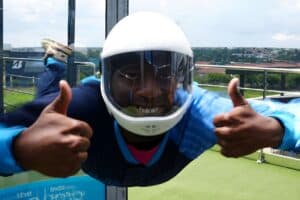Your nanny can contribute to your child's development with these easy tips.

Many mums and dads wonder if their kids are getting enough stimulation by leaving them with a nanny or grandparent. Here are some ways caretakers can contribute to your child’s development
LOVE children
Your nanny should be someone that will truly love your child, because if she does, the rest will come more naturally. Often if we also take good care of our nannies, they naturally become a part of the family, feel loved and can then only love the child more. We would all go off to work with a happy heart if we know that our children are in good care – someone that will laugh, hug and play with the children because they love them. Other skills can be taught, but love comes naturally.
Avoid screen time as a whole
It is highly recommended that children have no screen time at all for the first two years of their lives. Screen time is a whole topic on its own, but your nanny and children alike will be able to come up with better and more creative ideas on what to do with their time. This by itself will already boost your child’s development.
Limit the fancy extras
There are so many things available on the market that you can buy for your kids: walking rings and jolly jumpers for babies to fancy toys for older kids. Usually first-time parents are overwhelmed with what is available and what they should get for their kids. The honest truth is, not much. Less is more. A baby is much better off lying on a soft blanket on his/her tummy, or sitting with pillows supporting him until he can sit by himself. This will allow your child to use and strengthen his/ her own muscles instead of relying on a fancy piece of equipment.
Lots of interaction
Peek-a-boo, singing, reading books, looking in a mirror, pulling faces, pointing to different body parts whilst naming them, cuddling and rough and tumble play are all brilliant stimulating activities for the under 1 year old. Reading books, having discussions and by doing things together (baking, drawing, dancing, cleaning, playing) facilitates social skills and your child’s development.
Allow for exploration
Have areas around the house where they are allowed to go and explore. E.g. a kitchen cupboard with several unbreakable kitchen utensils (plastic containers, cups, spoons, muffin tins etc.) that your child is allowed to access, unpack and explore with these. Make sure that you don’t make it too cluttered. Pack away objects and change them frequently.
Have a few go-to’s
A sandpit or area where they can play in the sand outside is always a win. Having a ball, bicycle, a few books, fantasy toys (such as dinosaurs, dolls or figurines) that your child is interested in provides your child with a variety of options. Water play, play dough and painting are all great go-to’s for most kids of all ages.
Some play time ideas
- Build obstacle courses and houses with linen, chairs, cushions and pillows for them to climb into.
- Go for a walk (if possible) and collect specific objects such as little flowers, leaves, rocks etc.
- Make play dough and build various persons and objects. Let the child explore with different utensils too.
- Play outside with balls, have a tea party with the children’s teddy bears and dolls.
- Posting activities for the younger child: make different sized holes in a shoebox or container for your child to post different objects into (such as rocks, papers, balls and toys). This teaches them size concepts.
- Paint – use non-toxic finger paint or water paint and let your child explore. The child can paint with his/ her hands, sponge or a paint brush.
- Play with large blocks – build houses, roads, towers or anything they like. Don’t make it too structured, but a child learns by watching others, so play with him/ her.
- A little child loves cleaning. They would happily grab their own cloth, broom or duster and help with chores around the house. Include them in the household chores.
Exposure is key to a child’s development. The more a child is exposed to a variety of activities, the more they learn. Talk to them. Sing to them and dance with them. This will help develop language too and teach them the concept, and what it is called. And remember, do everything in a fun and loving way.
Anneke is a paediatric occupational therapist with special interest in sensory integration. She has been in private practice since 2011 and loves each moment spent with children. She has extensive experience working alongside a variety of schools, parents, teachers and therapists. Being a mother of two boys herself, she also has first-hand experience of being a parent. Anneke is also involved in providing training and workshops to caregivers that work with children with disabilities.
Based in Johannesburg, Anneke works with children that may have learning difficulties, sensory defensiveness, sensory processing disorders, developmental delays, scholastic difficulties, cerebral palsy, autism, epilepsy or any other diagnoses. She also has special interest in and is currently furthering her studies in dyslexia.
When asked about her work, Anneke would say: “I love what I do and believe that each child has a lot of potential that can be unlocked”.
Our website address is: and my Facebook page is: https://www.facebook.com/annekedejagerot/







